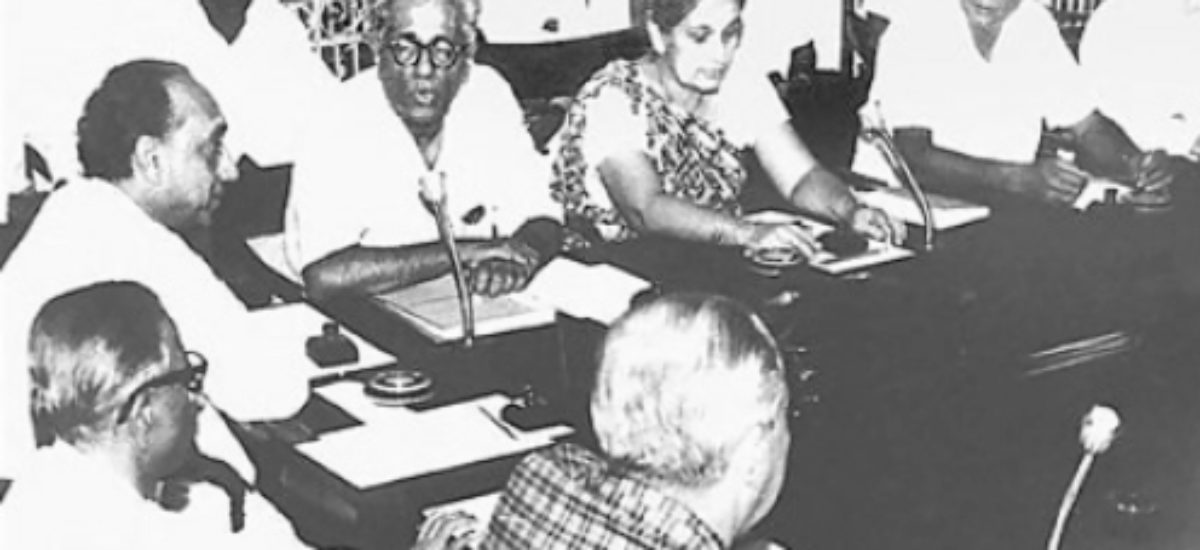Featured image courtesy the Sunday Leader
I’m responding to one aspect of the article by Dr Rohan Wickramasinghe published in The Island of 17 July, 2017. He poses the question as to what the aristocratic framers of the Indian and Sri Lankan Constitutions would have to say about the wish expressed in “Lyrics to Ludwig van Beethoven’s ninth symphony ‘Ode to Joy’ ” to have “beggars become brothers of Lords”. I don’t feel equal to answer the question but I wish to comment on his statement that Indian and Sri Lankan Constitution were framed by aristocrats.
Few would wish to challenge his classification of those who framed the three Sri Lankan Constitutions, viz Sir Ivor Jennings; Prime Minister Sirimavo Bandaranaike and Dr Colvin R de Silva; and President J.R Jayawardene as aristocrats. In the case of India, those who framed their Constitution were Prime Minister Jawaharlal Nehru and Dr B.R Ambedkar, Mahathma Gandhi had very little impact. I hold all three in very high regard,but Gandhi and Ambedkar never gelled. It was Gandhi and Nehru who decided that Ambedkar should chair and direct the drafting of the Indian Constitution. Early on, Gandhi proposed that India should be comprised of a very large number of semi-autonomous Village Panchayats. This was summarily rejected by Nehru and Ambedkar and, thereafter, Gandhi had virtually no say in the drafting of the Constitution. The vision shared by Nehru and Ambedkar was of an economically centralised Social Democratic State.
Ambedkar’s reaction to Gandhi’s proposal was very blunt: “What is a village but a sink of localism, a den of ignorance, narrow-mindedness and communalism….?”. (Constituent Assembly VII CAD 38-9, 4 Nov. Government of India Manager of Publications, of 1948). On this issue Nehru backed Ambedkar.
Both Nehru and Ambedkar were intellectual aristocrats and, in the case of Nehru, socially too. Sadly, in the case of Ambedkar he was born an “untouchable” and was repeatedly treated as one (though not, of course, by Gandhi and Nehru). Ambedkar began schooling seated on the ground in class while all the other children had desks and chairs. He had no friends and his fellow students would not interact with him. At meal times he would either sit under a tree and eat the lunch he had brought from home, or run home and back to class after a quick lunch.
Despite such cruel humiliation he outshone them all. A wealthy aristocrat heard of his plight and funded his education at the Ivy League Colombia University where he secured his Masters and Doctoral Degrees in Economics. He went on to London and secured the qualification of Barrister of Law. Later, with funding from another wealthy aristocrat he secured Masters and Doctoral degrees in economics from the London School of Economics and Political Science.
Back in India, he gave leadership to the Untouchables and planned to take them out of Hinduism, but his vision was very different to that of the Gandhi who was working to eradicate untouchability but ensuring that they remained within the Hindu fold. Gandhi had initially favored gradually eliminating the hierarchical aspect of caste, though towards the end of his life he encouraged inter – caste marriage with a view to eventually eradicate the caste system. Gandhi and Ambedkar differed bitterly on the system of caste reservations which had been introduced to the political system in the early twentieth century. While accepting caste quotas in political representation, Gandhi wanted the electorates to be purely territorial, whereas Ambedkar wanted the electorates to be segregated on the basis of caste, i.e each caste group would be required to elect its own representatives. Under the system favored by the Gandhi, even in the electorates reserved for Untouchable candidates the majority of voters would be high caste or middle caste. Ambedkar had good reason to fear this would ensure that the Untouchable candidates would avoid radical platforms that would alienate the non-Untouchable majority in every seat reserved for untouchable candidates.
The British Government halted progress towards independence until this issue was satisfactorily resolved. Gandhi began a fast to death, which Ambedkar saw as blackmail. If Gandhi died on this issue, there would surely be an India wide pogrom against Untouchables. Ambedkar was very bitter but relented and agreed to mixed (i.e totally territorial electorates) in exchange for an increased number of reservations. It is in this background that we need to understand the mind of Ambedkar when he published “What Congress and Gandhi have done to the Untouchables. Lashore: Classics of 1977”
It is to the credit of Gandhi that despite all this, he went along with Nehru in what surely would have been a difficult and unpopular decision to entrust the drafting of the Indian Constitution to Ambedkar. Not only India but other countries too benefited enormously from that pioneering Constitution. Sri Lanka has had three Constitutions and now it is going for its fourth, whereas the Ambedkar Constitution, with amendments from time to time, has survived and seems like it will endure for decades to come.
Readers who enjoyed this article might find “Bhimrao Ramji Ambedkar” and “On framing our constitution” enlightening.

